Just Four Men aka Four Just Men aka Wimple Winch
info courtesy Keith Shepherd
The band played the Liverpool area for a number of years, under a variety of names, including Dee Fenton and the Silhouettes, before arriving at their adoptive home of Manchester early 1963 and renaming themselves the Four Just Men.
Comprising at this time of Demetrius (Dee) Christopholus, vocals and Rhythm Guitar, Johnny Murphy, vocals and lead guitar, Larry Arendes, aka King, vocals and drums and bass player Pete Turner they played just a couple of gigs and decided to turn full time professional.
Pete elected not to be a professional musician so a replacement was needed. Manager Alan Cheatham knew that bass player/vocalist Keith Shepherd had just left Johnny Martin and The Tremors and was marking time playing with local ‘super group' ‘The Pete Bocking Six', a meeting was set up when Four Just Men were playing at the Princess Theatre Club in Chorlton Manchester.
A rehearsal was arranged for the following Wednesday, during which a phone call asked if the band could play at Adswood Youth Club between Cheadle and Stockport that night.
Dee, Larry and John asked Keith if he fancied sitting in, so with hastily written notes of the song keys, he did and remained with the band.
The next gig, a few days later on the Saturday was at the Cavern Club in Liverpool so that was to be the line up of the band for the next few months. (is it the gig advertised in this Cavern ad on the left?)
They became firmly established in a short time around the North West , then former guitarist with the band John Kelman, who had just played a stint with Freddie Starr and The Midnighters replaced John Murphy.
They ventured all over the country, touring up to the North of Scotland and down to the South of England becoming a group's group as well as popular with the fans.
Four Just Men were reputed as the first beat group to play a week's cabaret at the prestigious Mr Smith's night-club in Manchester, where a number of other bands could be seen watching every night.
Very often they were the selected group to perform at posh house parties, quite a novelty in the sixties!
Kennedy Street Enterprises' Ric Dixon, who ran Manchester 's famous Oasis Club and his own Dixon Agency prior to this, and had managed the Phantoms, of which Keith had been a member, approached and signed the band to the famous promotions and agency company.
Work continued to flow in but still there was no illusive recording contract other than an instrumental offer from a large record company, which they declined. They started to work on a regular basis for Granada Television under the direction of Musical Director Derek Hilton.
The boys could be heard playing backing material for dramas and plays, both instrumental and vocal, broke new ground by being featured in a spread in TV Times, and were allowed to use the sound studios there to make demos.
Pete Maclaine, working with the Clan since the Dakotas , both outfits also managed by Ric, had joined Billy J Kramer, was looking for a new band and approached the Four Just Men to see if they, as well as doing their own show, would back him. The answer was yes and Pete Maclaine and the Four Just Men were born.
Two auditions were later arranged, one at Andrew Oldham's Regent Sound Studios in which the five recorded a never to be released version of ‘Nobody's Child', which also featured John Paul Jones on piano. The second at EMI's Abbey Road Studio for producer Ron Richards. The latter wanted a one-name band rather than a singer's name at the front, however Pete wanted to maintain his hard-earned name and reputation as a solo singer so decided to leave. Ron signed the lads up to the Parlophone label as a four piece.
Ironically the day after the contract was signed John Hamp, the famous TV producer, who had heard the band's work on some of his productions for Granada , informed the boys that he had managed to obtain for them an offer of appearing in a film and a recording contract with RCA. Too late, and although the boys had signed, whilst under the age of twenty-one years, which at the time was not binding in law, they decided morally they should stay with EMI.
Incidentally during their work at Granada TV Burt Bacharach had recorded a special show at the studios whilst the group were in the sound studio and John Hamp had managed to have the song ‘Trains and Boats and Planes' offered to the Four Just Men before anyone else. This was later a hit for Billy J Kramer and the Dakotas and the Burt Bacharach Orchestra, however the Four Just Men amazingly turned it down in order to concentrate on self penned material! Perhaps not their wisest move. John Hamp's assistant Rod Taylor recorded it with the Four Just Men acting as session men just for the fun of it.
As the first record was about to be released by EMI, an other band, claiming that they had the name registered, threatened a law suit so the record was withdrawn, losing all the TV exposure that was booked. Granada 's ‘Scene At Six Thirty' show ran a competition featuring them as a ‘Band with no Name', asking people to suggest one, their plight was also being featured in a number of newspapers. At one stage they were being photographed by a newspaper outside Manchester 's new Crown Courts when the court officials, accompanied by several policemen, told them to move on or be arrested. Photography of the glass front of the court was not allowed whilst the court was in session so Four Just Men could have been Four Jailed Men! Although some amusing and some rather risqué names had been sent to the TV programme it was decided to switch the first two words around and Four Just Men became Just Four Men a consequence of this was EMI had to reprint the record labels delaying things even more.
At the original release date there were very few new records available but, unfortunately, at the new date both the Beatles and Rolling Stones had singles issued at around that time. Teenagers did not have the money to make several purchases in those days so obviously the big names were chosen to spend their cash on. EMI did miss a trick however as on the release date of the record ‘That's My Baby' Harold Wilson's Labour party had just won the General Election. The B-side of the record was ‘Things Will Never Be The Same', could that have been a premonition? Could that title have ensured big publicity being used as intro music for ministerial features following the government change? Perhaps the band was doomed not to have a huge hit.
ITV's famous ‘Thank Your Lucky Stars' show was arranged for the release of the second single ‘There's Not One Thing' / ‘Don't Come Any Closer' as was ‘Discs Ago-go' from the Bristol TV studios. Granada's own ‘Scene at Six Thirty' recorded the Just Four Men on film in the same session as the then, virtually unknown Righteous Brothers, with what was to be their first hit in the UK ‘You've Lost That Loving Feeling' at Belle Vue Gardens Manchester, one or two other TV stations featured them on shows.
At the Bristol show the Producer was so impressed with the band that instead of performing one mimed and one live he invited them to do four live, cutting the live one from another (Well-Known) band and squeezing in an other two live. This was after they had driven overnight (no motorways then) from the Beach Ballroom, Aberdeen arriving in Bristol about 6.30am!
There followed a tour with Del Shannon, Herman's Hermits, The Mindbenders and others including a band called the Soul Savages featuring a then unknown organist Paul Nicholas who later shot to fame as an actor and singer.
During the tour they were offered the chance to back a very famous singer, which they declined; perhaps another not very wise move. ‘Don't Come Any Closer' received play in the seventies and was described as an excellent blues song by a late lamented DJ.
It was recorded in one take at Abbey Road , vocals and backing together, with just three or four minutes of studio time left perhaps at last capturing some of the live sound of the band as the adrenaline flowed.
The third and last visit to EMI was to record a song made famous by Sammy Davies Junior ‘In the Shelter of Your Arms' this however was never released.
To this day Keith still has the Granada recordings, including Rod Taylor and some instrumentals, the Pete McClaine sessions other demos and the Shelter of Your Arms recordings.
They featured on a double CD called the Beat Merchants, plus a recent instrumental CD with a copy of a tune that was only originally on an acetate, plus a CD featuring them on a specialist label, Bam Caruso.
The band playing live were exciting with a prominent bass heavy sound, probably being the first to cover Tamla Motown material over here, this live mix was to an extent reflected in their demos. They even used to listen to Radio Luxembourg, weekdays at 11.55pm and 0055am, to the Tamla show and learn the newest releases but never divulged this information to any other group so as to keep some steps ahead. One of the songs recorded for a Granada play was the Motown classic ‘Heatwave'. EMI recordings never captured this excitement, the producer Ron Richards appeared to favour the more toppy sounds similar to that of a couple of his other bands and this came through on Just Four Men's records.
They carried on to 1966 when they were offered a winter residency in Paris. Keith decided that since they sang ‘April in Paris' but nobody seemed to get too excited about Christmas in Paris he would leave the band and work in his Father's garage business. A new bass player, Stuart Sirrett, joined but after less than a month left with the boys again turning to Keith who played with them until a permanent replacement, Barry Ashall, could be found, Keith eventually leaving just before the France trip. A short time later, having parted company with Kennedy Street, Just Four Men changed its name to the Wimple Winch and embarked on a more heavy and psychedelic form of music.
- Demetrius later appeared in some musicals such as Hair in the West End and with the touring shows also a TV play, then ran an entertainment agency for a while.
- Larry played drums with a band in Liverpool as well as being a photographer.
- Lawrence Arendes (now King) joined Sponze, a late sixties, slightly jazzy progressive rock combo, who backed Dave Berry on a 1969 single, Huma Luma). They later became into Pacific Drift, who recorded an album and single for Deram in 1970.
- John Kelman joined the Manchester Big 3 and then Pete Maclaine and the Clan, before returning to Liverpool to live with his parents in Huyton Liverpool, where in the 70s he formed a new lineup of The Four Just Men, with 3 guys from Runcorn, Frank Garland (rhythm guitar, Mal Hoyland bass guitar and Arty Davies on drums).
- Keith having long sold his late Father's business was enticed back to music originally playing in theatre backing bands, and today, is still singing and playing solo, duo and sometimes band, work being well known in the country music scene in this country as well as playing 50s/60 music. He also writes a column in the ‘Country Music Round Up' newspaper. After a number of requests, he is considering putting a band together as the Four Just or Just Four Men, playing the same songs as in their era.
Should any one want more info on the band etc. Keith is contactable and only too willing to talk with anyone who knew them or who now knows of them and would like more details at
Confirmed?
Reported on two sites that Lally Stott was a one-time member of Just Four Men. Lally who? Lally, a Liverpudlian, was the writer of 'Chirpy Chirpy Cheep Cheep'.
Arty Davies confirms Lally Stott played lead guitar for a while when John Kelman left to join Freddie Starr and the Midnighters, but left when John rejoined.
Memories
"I was deejaying in Stockport at the "Sinking Ship"and Wimple Winch used to stop overnight at the flat above the club. I went to a few gigs with them. One particular gig I remember was at "Rowntrees Sound Bars" where they brought the house down. On Granada TV Johnny Hamp was asked "who will be the next big thing"?? and without hesitation he answered "Four Just Men".
I also remember John Peel doing a programme about Liverpool groups and I sent him a letter asking him to play "Theres not one thing". He played the disc ,and wrote back to me saying it was one of his favourite songs from that era."
Tony Just


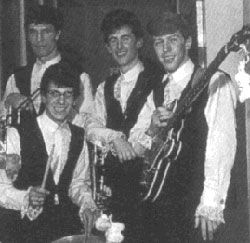
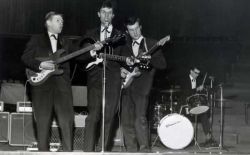
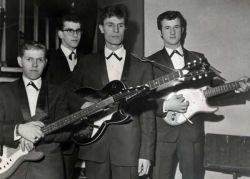
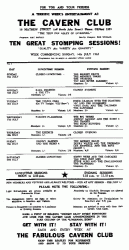
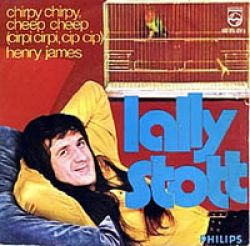
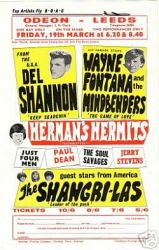
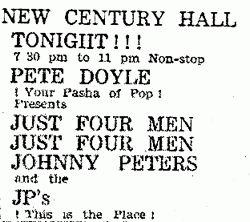



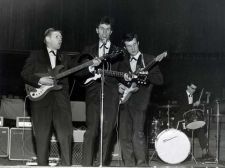



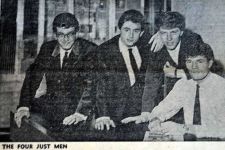


Comments